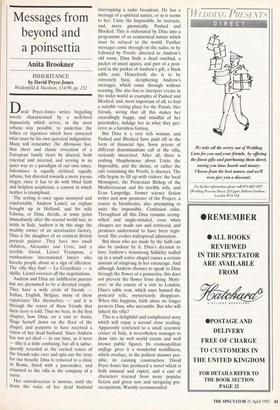Messages from beyond and a poinsettia
Anita Brookner
INHERITANCE by David Pryce-Jones
Weidenfeld & Nicolson, £14.99, pp. 252
David Pryce-Jones writes beguiling novels characterised by a well-bred impassivity which serves, in the most urbane way possible, to underline the follies or injustices which have attracted what must be his own quizzical indignation. Many will remember The Afternoon Sun, that short and classic evocation of a European family beset by discord, both external and internal, and serving in its quiet way as a paradigm of our own times. Inheritance is equally civilised, equally urbane, but directed towards a more joyous target, since it has to do with blind faith and helpless scepticism, a contest in which neither is triumphant.
The setting is once again moneyed and comfortable. Andrew Lumel, an orphan brought up in Holland, and his wife Edwina, or Dina, decide, at some point immediately after the second world war, to settle in Italy. Andrew is by this stage the wealthy owner of an aeronautics factory, Dina is the daughter of an eminent British portrait painter. They have two small children, Alexander and Ursie, and a terrible friend, Lionel Frampton, a rumbustious international lawyer who knocks people about as a sign of affection. The villa they find — La Gracchiata — is idyllic. Lionel oversees all the negotiations.
Andrew and Dina are indifferent parents but are presumed to be a devoted couple. They have a wide circle of friends Italian, English, Belgian, many of them expatriates like themselves — and it is through the voices of these friends that their story is told. Thus we hear, in the first chapter, how Dina, on a visit to Assisi, flings herself down on the floor of the chapel, and purports to have received a vision of her dead husband. Since Andrew has not yet died — in our time, as it were — this is a little confusing, but all is subse- quently revealed as the excited voices of the friends take over and spin out the story for our benefit. Dina is removed to a clinic in Rome, fitted with a pacemaker, and returned to the villa in the company of a nurse.
Her convalescence is morose, until she hears the voice of her dead husband interrupting a radio broadcast. He has a message of a spiritual nature, or so it seems to her. Unite the Impossible, he instructs, and, more gnomically, Pushed and Blocked. This is elaborated by Dina into a programme of an ecumenical nature which must be relayed to the world. Further messages come through on the radio, to be followed by Proofs: directed to Andrew's old room, Dina finds a dead rosebud, a packet of uncut agates, and part of a post- card in the pocket of Andrew's gift, a black sable coat. Henceforth she is to be extremely busy, deciphering Andrew's messages, which come through without warning. She also has to interpret events in the wider world as examples of Pushed and Blocked, and, most important of all, to find a suitable resting place for the Proofs. Her friends, seeing that all this makes her exceedingly happy, and mindful of her pacemaker, indulge her in what they per- ceive as a harmless fantasy.
But Dina is a very rich woman, and Pushed and Blocked have paid off in the form of financial tips. Soon priests of different denominations call at the villa, variously interested. After all, there is nothing blasphemous about Unite the Impossible, and the shrine, or rather the safe containing the Proofs, is discreet. The villa begins to fill up with visitors: the local Monsignor, the Protestant Bishop of the Mediterranean and his terrible wife, and Evan Langridge, former science fiction writer and now promoter of the Project, a course in biosthenics, also attempting to unite the impossible. Confusion rules. Throughout all this Dina remains strong- willed and single-minded, even when cheques are made out and retrieved, and promises understood to have been regis- tered. She evokes widespread admiration.
But those who are made by the faith can also he undone by it. Dina's decision to have Andrew's Armstrong Siddeley walled up in a small votive chapel causes a certain amount of misgiving in her entourage. And although Andrew chooses to speak to Dina through the flower of a poinsettia, this does not prevent the flower from dying. More- over, in the course of a visit to London, Dina's sable coat, which once housed the postcard relic, mysteriously disappears. When this happens, faith alone no longer protects Dina, who succumbs. But who will inherit the villa?
This is a delightful and complicated story which will repay a second close reading.
Apparently restricted to a small eccentric corner of Italy, it nevertheless manages to draw into its web world events and well known public figures. Its cosmospolitan staffage gives it a wonderful worldliness, which overlays, in the politest manner pos- sible, its cunning construction. David Pryce-Jones has produced a novel which is both unusual and expert, and a cast of characters rescued from more popular fiction and given new and intriguing pre- occupations. Warmly recommended.


























































 Previous page
Previous page